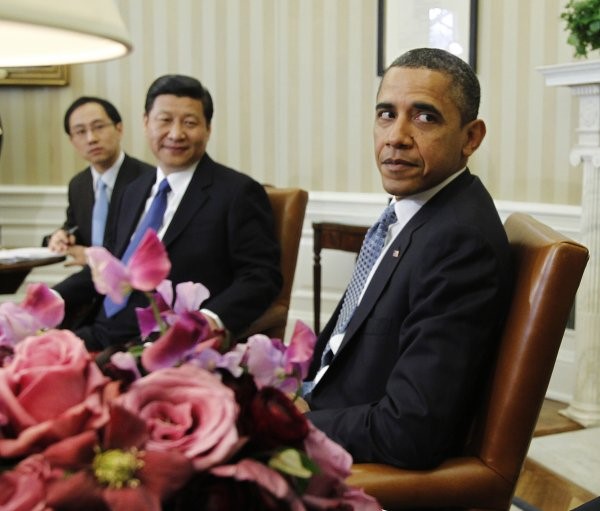The recent cosy-up between the Thai junta and the Chinese leadership has reflected the shift of the regional order. China is certainly on the rise. Thailand, even under civilian regimes, has been willing to bend backwards to please China. With the Americans coming out to criticise the coup, the military leaders have then switched their alliance to Beijing, at least for the time being.

Chinese Presidenty Xi Jinping and US President Barack Obama
Bilateral ties have been amicable. China has strictly upheld a non-interference policy vis-à-vis Thailand. Leaders in Beijing concentrate on “making money rather than enemies” and are content to stay neutral in Thailand’s polarised politics. Sean Crispin noted that China’s pragmatic diplomacy throughout the recent Thai crisis stole yet another march from the United States’ interventionist approach, as both countries have become locked in a subtle, but intensifying, competition for increased influence in Thailand and the region. While certain Thai political players are watching the United States through suspicious eyes, they feel more comfortable with China’s position in the conflict.
Years ago, in my discussion with Chinese Ambassador to Singapore, Wei Wei, he stressed that China may be anxious to learn what has been going in Thailand, but it adhered to the principle of non-interference. He told me, “This is Thailand’s internal affairs”. The clash between the two approaches, China’s pragmatism and US’s interventionism signifies a compelling rivalry between the United States and China. Already, China’s non-interference approach has proven to be effective in cementing its ties with Cambodia, Laos and Myanmar, and has now been met with a favourable response from the Thai junta who have insisted on handling their own internal problems without outside pressure.
The United States may have been a strategic partner of Thailand, but Washington’s hands-on approach has widened the gap in this partnership. The junta may not be happy to hear US Ambassador Kristie Kenny urging for an election soon. At the same time, China has quietly bid to capitalise on that gap, presenting itself as an impartial power in the Thai conflict. Moreover, China has no pretence about promoting human rights and democracy. This firm posture has to a great extent guaranteed that China would not push for political reforms, or early election in Thailand.
Thai-U.S. relations have in the past years turned somewhat erratic. The period saw the United States awarding major non-NATO ally status to Thailand. It also witnessed gross human rights violations in Thailand, which were a subject of concern of the Bush and Obama administrations. Whereas economic relations have remained one of the core elements of this bilateral relationship, the FTA negotiations were derailed by Thai domestic political factors.
Thailand is indeed the oldest ally of the United States in Asia. The 1833 Treaty of Amity and Commerce set off this relationship which proved to be crucial in subsequent years when an American friend was needed to pull Thailand out of dangerous situations and to help it ward off enemies. For instance, the United States protected Thailand from demands of war reparations by Britain in the aftermath of the Second World War. It also granted generous financial and military aid to Thailand in the containment efforts against communism during the Cold War.
In return, the Thai state was obliged to cultivate an anti-communist reputation to satisfy the U.S. government in order to justify the American aid grant. The mutual benefit allowed the United States to reconstruct an anti-communist Thai state, which openly condoned the rise of militarism. In 1982, the Thai and U.S. forces commenced annual joint training exercises “Cobra Gold” to symbolise the U.S. military presence in Southeast Asia. From this historical point of view, the United States has found it “legitimate” to frequently intervene in Thailand’s domestic and external affairs, primarily to protect its own power position in the region.
It is important to note that the Thai-U.S. security alliance has remained the fundamental element in their relationship. This security alliance in the modern era is governed by two core agreements: the 1954 Manila Pact and the 1962 Thanat-Rusk Communiqué. The Manila Pact has its roots in the Cold War and involved eight countries—Australia, France, Great Britain, New Zealand, Pakistan, the Philippines, Thailand and the United States—and was committed through the Southeast Asia Treaty Organisation (SEATO), a supposedly identical twin of the North Atlantic Treaty Organisation (NATO), to stem communist expansion. SEATO was eventually dissolved in 1977 but the Manila Pact provisions committing the United States to protect Thailand from communism remain in force. The Thanat-Rusk Communiqué expanded this undertaking. It was signed by Thai Foreign Minister Thanat Khoman and his American counterpart Dean Rusk. It pledged each country to come to the other’s aid in the event of any external attack. These have underpinned Washington’s military support to Bangkok through arms, training and education. More essentially, they have given the United States a wide range of comparative advantages, especially in terms of scope and room to advance its interests vis-à-vis Thailand. China certainly does not have an equivalent defence treaty with Thailand which could be utilised to “legally” push its strategic interests while Beijing is dealing with Bangkok on a variety of issues.
The two agreements have equally benefited Thailand and the United States. On the Thai part, the kingdom gains most from the access to training and exercises essential to professional development of the armed forces. Thailand currently hosts approximately 60 U.S.-led military exercises annually through the Cobra Gold series. Its main benefit from the alliance also lies in the access it provides to doctrinal support, education opportunities and advanced equipment sales. In the case of Thailand being confronted by external threats, U.S. support would undoubtedly prove vital.
Likewise, as defence expert Robert Karniol argues, the United States also benefits from extensive training sites and facilities in Thailand. There is also Bangkok’s wider support—cooperation in combating terrorism, helping contain arms proliferation, hosting U.S.-led regional relief operations and sending peacekeepers to Darfur. As a result, Thailand was supposedly obliged to hand over suspected Russian arms dealer Victor Bout to the United States in November 2010 since the bilateral security alliance indicates the need for both countries to work together in the area of arms trafficking.
While in recent years the United States has not pressed the Thai government to acquire more facilities and access under the security treaties in the way in which it has been doing in the Philippines, it has allegedly turned Thailand into a secure destination for situating secret interrogation facilities inside a Thai military base where terror suspects from Pakistan and Afghanistan were held captive. In sum, bilateral activities through existing defence agreements have brought various advantages to each partner while promoting broader bilateral cooperation.
But the current circumstances in Thailand have greatly complicated the United States’ interventionist approach as it could never fully satisfy one faction in the conflict without displeasing the other. The complication multiplies as China’s rise poses as a challenge to the United States’ hegemony in the region. Demoralised by Thailand’s increasingly intimate courtship with China, the United States has exercised its supposedly legitimate right to interfere in Thai affairs as part of competing with China for Thai influence, while making use of its firm strategic partnership with Thailand as its own comparative advantage.
Thailand and the United States have had a comprehensive relationship covering all important areas relating to politics, economic, security, defence, education, health and human security, science and technology, sustainable development and the environment. Both have had a forum for consultation and dialogue on their bilateral relationship called the “Thai-U.S. Strategic Dialogue”. Both also agreed to draw the Thai-U.S. Plan of Action which was to be a roadmap for moving forward the bilateral relationship. And certainly, the United States possessed one thing that China lacked — some moral authority.
At the height of political tensions in Bangkok in the pre-coup period, Thaksin wrote a personal message to President Bush, dated 23 June 2006, reporting that he was politically bullied. He said, “There has been a threat to democracy in Thailand since early this year. Key democratic institutions, such as elections and the observance of Constitutional limitations on government, have been repeatedly undermined.” Later, despite possessing an ambivalent attitude toward the United States because of its interventionist approach, the Abhisit Vejjajiva government was delighted that that the U.S. Congress voted 411-4 to support the Thai premier’s reconciliation plan which stressed the need to uphold the monarchy, reform politics, and end injustice. Immediately, Abhisit claimed that the motion showed that the United States regarded his government positively. Meanwhile, the UDD submitted a letter to the U.S. Embassy in Bangkok requesting the U.S. House of Representatives review its resolution to support the Abhisit government’s roadmap to reconciliation. In many ways, the Thai political players, while seeking to find moral espousal from the United States, have deliberately permitted Washington to become involved in domestic politics.
 Pavin Chachavalpongpun is associate professor at Kyoto University’s Centre for Southeast Asian Studies.
Pavin Chachavalpongpun is associate professor at Kyoto University’s Centre for Southeast Asian Studies.
Prachatai English is an independent, non-profit news outlet committed to covering underreported issues in Thailand, especially about democratization and human rights, despite pressure from the authorities. Your support will ensure that we stay a professional media source and be able to meet the challenges and deliver in-depth reporting.
• Simple steps to support Prachatai English
1. Bank transfer to account “โครงการหนังสือพิมพ์อินเทอร์เน็ต ประชาไท” or “Prachatai Online Newspaper” 091-0-21689-4, Krungthai Bank
2. Or, Transfer money via Paypal, to e-mail address: [email protected], please leave a comment on the transaction as “For Prachatai English”
